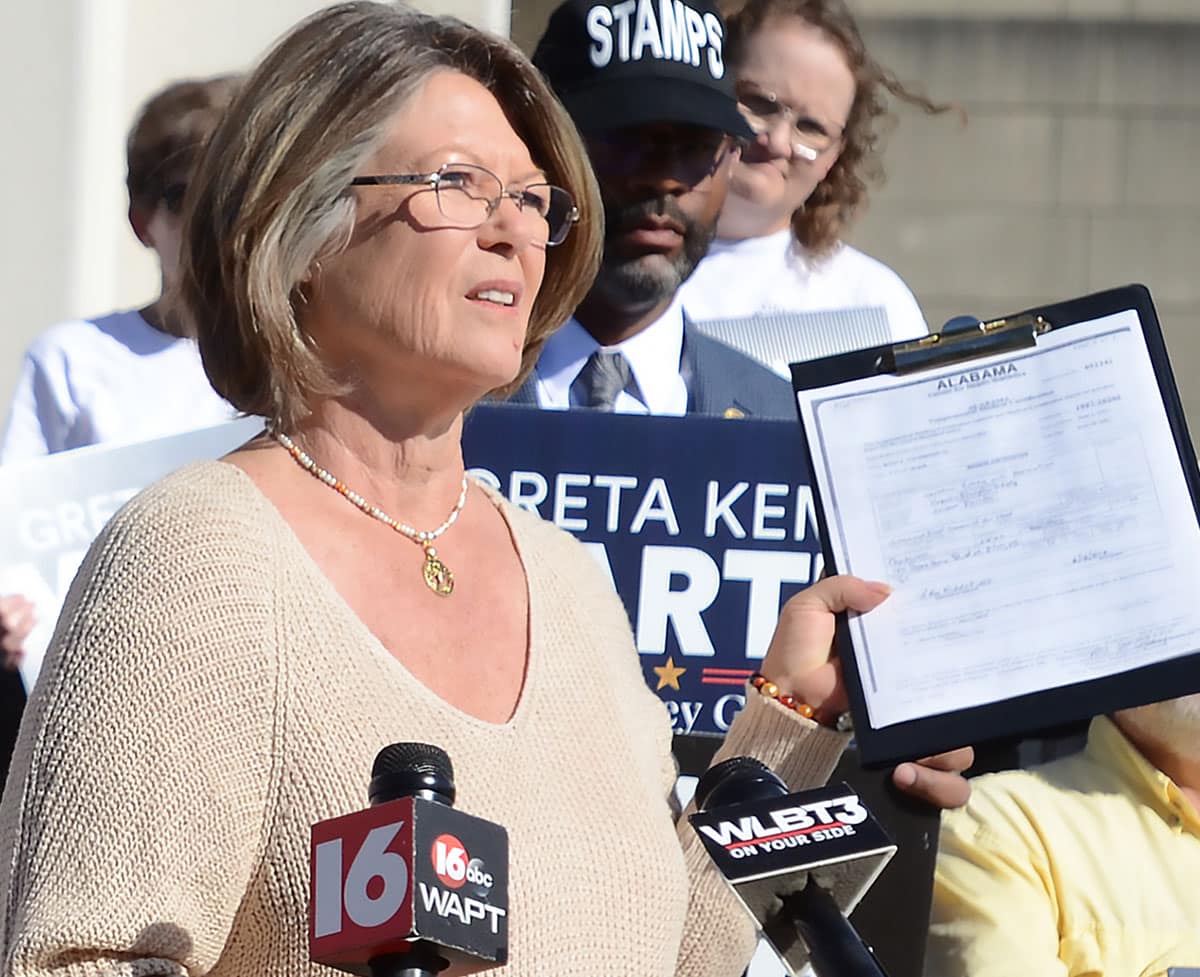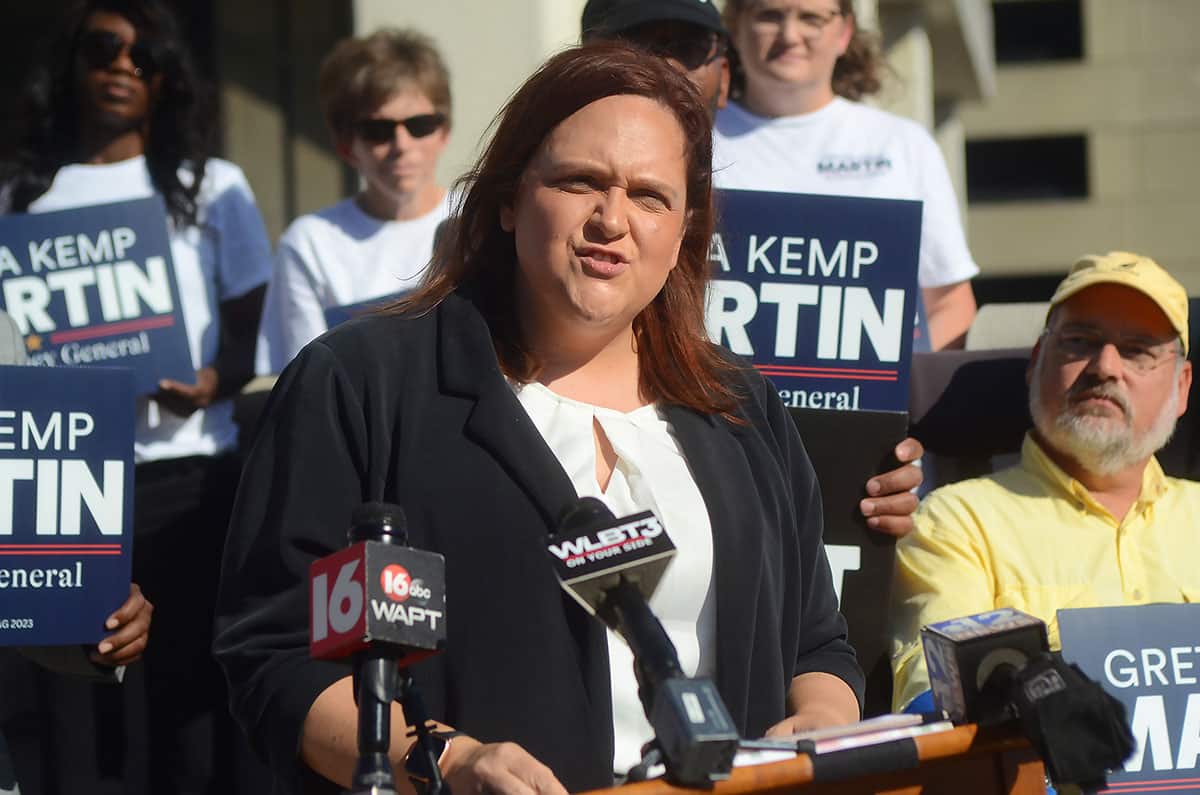Mississippi Today
Few hopes for freedom left for woman serving life in shaken baby syndrome death

The case of a woman convicted over 20 years ago for the death of her former-fiance’s son could be reexamined through a conviction integrity unit proposed by Democratic Attorney General candidate Great Kemp Martin.
Tasha Shelby has been serving a life sentence without parole at the Central Mississippi Correctional Facility since her 2000 capital murder conviction for the death of her stepson, Bryan Thompson IV.
Shelby’s attorney, family members and supporters believe she is innocent because of the toddler’s family history of seizures and evolving science behind “Shaken Baby Syndrome.”
They see a conviction integrity unit as one of the last options they could use to free Shelby.
“We’ve been fighting for Tasha for 26 years,” said Shelby’s aunt Penny Warner at a Tuesday press conference with Kemp Martin.
Last week a panel of the state Supreme Court denied her request for a new trial. That leaves Shelby with few options such as asking the attorney general to dismiss her charge or requesting a pardon from the governor’s office, which the supporters have done.

Kemp Martin, who met and talked with Shelby last week, said her proposed conviction integrity unit could help her and others across the state. She said the unit would look at cases of innocence, wrongful conviction, prosecutorial misconduct and evidence.
“Her fate is sealed unless someone steps in to intervene,” Kemp Martin said.
Warner planned to visit Shelby after the press conference and tell her about the recent development in her case. The Tennessee native is the relative who lives closest to Shelby, and Warner said she makes the drive down to the Jackson area every few months.
Warner sees Shelby as one of her daughters and she’s waiting for the call that says she can come home. Her niece would live with her, and Warner has already prepared an outfit for her niece to wear when she gets out of prison.
“I cannot do what she has done,” Warner said about her niece being incarcerated for over 20 years. “She has remained so positive. She has a very strong faith and we all pray for her all the time. I kept thinking she’d be home by now.”
A seizure or shaken baby syndrome?
On the early morning of May 30, 1997, 22-year-old Shelby heard a thump and found 2½-year-old Bryan on the floor struggling to breath and having what appeared to be a seizure. She called the toddler’s father who was at work and they rushed the toddler to the hospital.

Prosecutors believed Shelby was responsible for the toddler’s brain injuries. An expert witness for the state who conducted the autopsy testified Bryan’s injuries showed someone intentionally shook him and banged his head against something – injuries consistent with “shaken baby syndrome.”
Yet in a similar later case in Alabama where state expert Dr. Scott Benton was a paid expert for the defense, he offered conflicting testimony.
West Virginia Innocence Project Director Valena Beety took on Shelby’s case in 2011 while working at the Mississippi Innocence Project. In interviews and court filings, Beety has argued that Shelby is innocent, and experts have cited advances in medical science that have undermined shaken baby syndrome – now referred to as abusive head trauma.
Legal attempts to revisit Shelby’s conviction
LeRoy Riddick, the medical examiner who ruled Bryan’s death a homicide, reexamined medical records and concluded a family history of seizures may have contributed to the toddler’s death and injuries that are consistent with shaken baby syndrome, so he changed the manner of death from homicide to an accident, Mississippi Today reported in its investigation “Shaky Science, Fractured Families.”
From Riddick’s updated opinion and evolving science about shaken baby syndrome, Shelby asked for a new trial. The state called child abuse pediatrician Benton to testify at Shelby’s 2018 Post-Conviction Relief hearing. He maintained that Bryan died from blunt force trauma with shaking.
The next year, a Harrison County Circuit Court judge upheld Shelby’s conviction, saying that shaken baby syndrome hasn’t been “debunked.”
Shelby tried the federal court by filing a habeas petition with the U.S. District Court for the Southern District of Mississippi in 2021, but earlier this year that petition was dismissed because it was time-barred.
Beety, Shelby’s attorney, filed another petition for post-conviction relief in March based on contradictory testimony by Benton, which was first reported in Mississippi Today’s “Shaky Science, Fractured Families” series.
She argued in the court records that the testimony Benton gave as an expert in 2022 for a man accused of child abuse in Alabama would have supported relief for Shelby at her 2018 post-conviction relief hearing.
The motion for post-conviction relief also cited new evidence: one of the jurors in Shelby’s case was the toddler’s great-uncle by marriage and had heard about the child’s death before trial, according to court records.
A panel of the state Supreme Court dismissed Shelby’s request for a new trial but allowed the George Cochran Innocence Project at Ole Miss to file an amicus brief to support her. Beety, Shelby’s attorney, said the order did not make sense, so she has filed a motion for clarification this week.
This article first appeared on Mississippi Today and is republished here under a Creative Commons license.
Mississippi Today
1964: Mississippi Freedom Democratic Party was formed
April 26, 1964

Civil rights activists started the Mississippi Freedom Democratic Party to challenge the state’s all-white regular delegation to the Democratic National Convention.
The regulars had already adopted this resolution: “We oppose, condemn and deplore the Civil Rights Act of 1964 … We believe in separation of the races in all phases of our society. It is our belief that the separation of the races is necessary for the peace and tranquility of all the people of Mississippi, and the continuing good relationship which has existed over the years.”
In reality, Black Mississippians had been victims of intimidation, harassment and violence for daring to try and vote as well as laws passed to disenfranchise them. As a result, by 1964, only 6% of Black Mississippians were permitted to vote. A year earlier, activists had run a mock election in which thousands of Black Mississippians showed they would vote if given an opportunity.
In August 1964, the Freedom Party decided to challenge the all-white delegation, saying they had been illegally elected in a segregated process and had no intention of supporting President Lyndon B. Johnson in the November election.
The prediction proved true, with white Mississippi Democrats overwhelmingly supporting Republican candidate Barry Goldwater, who opposed the Civil Rights Act. While the activists fell short of replacing the regulars, their courageous stand led to changes in both parties.
This article first appeared on Mississippi Today and is republished here under a Creative Commons Attribution-NoDerivatives 4.0 International License.![]()
Mississippi Today
Mississippi River flooding Vicksburg, expected to crest on Monday
Warren County Emergency Management Director John Elfer said Friday floodwaters from the Mississippi River, which have reached homes in and around Vicksburg, will likely persist until early May. Elfer estimated there areabout 15 to 20 roads underwater in the area.
“We’re about half a foot (on the river gauge) from a major flood,” he said. “But we don’t think it’s going to be like in 2011, so we can kind of manage this.”
The National Weather projects the river to crest at 49.5 feet on Monday, making it the highest peak at the Vicksburg gauge since 2020. Elfer said some residents in north Vicksburg — including at the Ford Subdivision as well as near Chickasaw Road and Hutson Street — are having to take boats to get home, adding that those who live on the unprotected side of the levee are generally prepared for flooding.



“There are a few (inundated homes), but we’ve mitigated a lot of them,” he said. “Some of the structures have been torn down or raised. There are a few people that still live on the wet side of the levee, but they kind of know what to expect. So we’re not too concerned with that.”
The river first reached flood stage in the city — 43 feet — on April 14. State officials closed Highway 465, which connects the Eagle Lake community just north of Vicksburg to Highway 61, last Friday.

Elfer said the areas impacted are mostly residential and he didn’t believe any businesses have been affected, emphasizing that downtown Vicksburg is still safe for visitors. He said Warren County has worked with the U.S. Army Corps of Engineers and the Mississippi Emergency Management Agency to secure pumps and barriers.
“Everybody thus far has been very cooperative,” he said. “We continue to tell people stay out of the flood areas, don’t drive around barricades and don’t drive around road close signs. Not only is it illegal, it’s dangerous.”
NWS projects the river to stay at flood stage in Vicksburg until May 6. The river reached its record crest of 57.1 feet in 2011.




This article first appeared on Mississippi Today and is republished here under a Creative Commons Attribution-NoDerivatives 4.0 International License.![]()
Mississippi Today
With domestic violence law, victims ‘will be a number with a purpose,’ mother says
Joslin Napier. Carlos Collins. Bailey Mae Reed.
They are among Mississippi domestic violence homicide victims whose family members carried their photos as the governor signed a bill that will establish a board to study such deaths and how to prevent them.
Tara Gandy, who lost her daughter Napier in Waynesboro in 2022, said it’s a moment she plans to tell her 5-year-old grandson about when he is old enough. Napier’s presence, in spirit, at the bill signing can be another way for her grandson to feel proud of his mother.
“(The board) will allow for my daughter and those who have already lost their lives to domestic violence … to no longer be just a number,” Gandy said. “They will be a number with a purpose.”
Family members at the April 15 private bill signing included Ashla Hudson, whose son Collins, died last year in Jackson. Grandparents Mary and Charles Reed and brother Colby Kernell attended the event in honor of Bailey Mae Reed, who died in Oxford in 2023.
Joining them were staff and board members from the Mississippi Coalition Against Domestic Violence, the statewide group that supports shelters and advocated for the passage of Senate Bill 2886 to form a Domestic Violence Facility Review Board.
The law will go into effect July 1, and the coalition hopes to partner with elected officials who will make recommendations for members to serve on the board. The coalition wants to see appointees who have frontline experience with domestic violence survivors, said Luis Montgomery, public policy specialist for the coalition.
A spokesperson from Gov. Tate Reeves’ office did not respond to a request for comment Friday.
Establishment of the board would make Mississippi the 45th state to review domestic violence fatalities.
Montgomery has worked on passing a review board bill since December 2023. After an unsuccessful effort in 2024, the coalition worked to build support and educate people about the need for such a board.
In the recent legislative session, there were House and Senate versions of the bill that unanimously passed their respective chambers. Authors of the bills are from both political parties.
The review board is tasked with reviewing a variety of documents to learn about the lead up and circumstances in which people died in domestic violence-related fatalities, near fatalities and suicides – records that can include police records, court documents, medical records and more.
From each review, trends will emerge and that information can be used for the board to make recommendations to lawmakers about how to prevent domestic violence deaths.
“This is coming at a really great time because we can really get proactive,” Montgomery said.
Without a board and data collection, advocates say it is difficult to know how many people have died or been injured in domestic-violence related incidents.
A Mississippi Today analysis found at least 300 people, including victims, abusers and collateral victims, died from domestic violence between 2020 and 2024. That analysis came from reviewing local news stories, the Gun Violence Archive, the National Gun Violence Memorial, law enforcement reports and court documents.
Some recent cases the board could review are the deaths of Collins, Napier and Reed.
In court records, prosecutors wrote that Napier, 24, faced increased violence after ending a relationship with Chance Fabian Jones. She took action, including purchasing a firearm and filing for a protective order against Jones.
Jones’s trial is set for May 12 in Wayne County. His indictment for capital murder came on the first anniversary of her death, according to court records.
Collins, 25, worked as a nurse and was from Yazoo City. His ex-boyfriend Marcus Johnson has been indicted for capital murder and shooting into Collins’ apartment. Family members say Collins had filed several restraining orders against Johnson.
Johnson was denied bond and remains in jail. His trial is scheduled for July 28 in Hinds County.
He was a Jackson police officer for eight months in 2013. Johnson was separated from the department pending disciplinary action leading up to immediate termination, but he resigned before he was fired, Jackson police confirmed to local media.
Reed, 21, was born and raised in Michigan and moved to Water Valley to live with her grandparents and help care for her cousin, according to her obituary.
Kylan Jacques Phillips was charged with first degree murder for beating Reed, according to court records. In February, the court ordered him to undergo a mental evaluation to determine if he is competent to stand trial, according to court documents.
At the bill signing, Gandy said it was bittersweet and an honor to meet the families of other domestic violence homicide victims.
“We were there knowing we are not alone, we can travel this road together and hopefully find ways to prevent and bring more awareness about domestic violence,” she said.
This article first appeared on Mississippi Today and is republished here under a Creative Commons Attribution-NoDerivatives 4.0 International License.
-

 News from the South - Florida News Feed6 days ago
News from the South - Florida News Feed6 days agoJim talks with Rep. Robert Andrade about his investigation into the Hope Florida Foundation
-

 News from the South - Alabama News Feed5 days ago
News from the South - Alabama News Feed5 days agoPrayer Vigil Held for Ronald Dumas Jr., Family Continues to Pray for His Return | April 21, 2025 | N
-

 Mississippi Today5 days ago
Mississippi Today5 days ago‘Trainwreck on the horizon’: The costly pains of Mississippi’s small water and sewer systems
-

 News from the South - Florida News Feed4 days ago
News from the South - Florida News Feed4 days agoTrump touts manufacturing while undercutting state efforts to help factories
-

 News from the South - Texas News Feed5 days ago
News from the South - Texas News Feed5 days agoMeteorologist Chita Craft is tracking a Severe Thunderstorm Warning that's in effect now
-

 News from the South - Florida News Feed4 days ago
News from the South - Florida News Feed4 days agoFederal report due on Lumbee Tribe of North Carolina’s path to recognition as a tribal nation
-

 News from the South - Arkansas News Feed6 days ago
News from the South - Arkansas News Feed6 days agoAs country grows more polarized, America needs unity, the ‘Oklahoma Standard,’ Bill Clinton says
-

 News from the South - Virginia News Feed5 days ago
News from the South - Virginia News Feed5 days agoTaking video of military bases using drones could be outlawed | Virginia














































